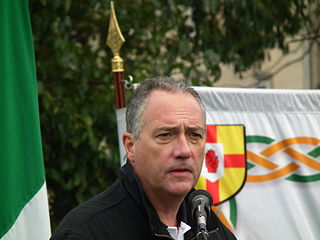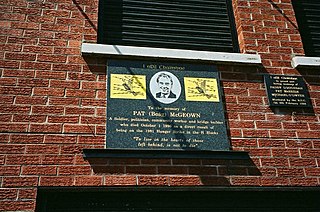Related Research Articles

The 1981 Irish hunger strike was the culmination of a five-year protest during the Troubles by Irish republican prisoners in Northern Ireland. The protest began as the blanket protest in 1976, when the British government withdrew Special Category Status for convicted paramilitary prisoners. In 1978, the dispute escalated into the dirty protest, where prisoners refused to leave their cells to wash and covered the walls of their cells with excrement. In 1980, seven prisoners participated in the first hunger strike, which ended after 53 days.

An Phoblacht is a formerly weekly, and currently monthly newspaper published by Sinn Féin in Ireland. From early 2018 onwards, An Phoblacht has moved to a magazine format while remaining an online news platform. Editorially the paper takes a left-wing, Irish republican position and was supportive of the Northern Ireland peace process. Along with covering Irish political and trade union issues the newspaper frequently featured interviews with celebrities, musicians, artists, intellectuals and international activists. The paper sells an average of up to 15,000 copies every week. During the 1981 Irish hunger strike its sales soared to over 70,000 per week.

Daniel Gerard Morrison is an Irish former Provisional Irish Republican Army (IRA) volunteer, author and activist who played a crucial role in public events during the Troubles in Northern Ireland. An Irish republican, Morrison is also a former Sinn Féin publicity director and editor of Republican News and An Phoblacht. He is the secretary of the Bobby Sands Trust and current chairman of Féile an Phobail, the largest community arts festival in Ireland.

Séanna Walsh or Séanna Breathnach is a Sinn Féin member of Belfast City Council and a former volunteer in the Provisional Irish Republican Army (IRA).
The blanket protest was part of a five-year protest during the Troubles by Provisional Irish Republican Army (IRA) and Irish National Liberation Army (INLA) prisoners held in the Maze prison in Northern Ireland. The republican prisoners' status as political prisoners, known as Special Category Status, had begun to be phased out in 1976. Among other things, this meant that they would now be required to wear prison uniforms like ordinary convicts. The prisoners refused to accept the administrative designation of ordinary criminals, and refused to wear the prison uniform.

The dirty protest was part of a five-year protest during the Troubles by Provisional Irish Republican Army (IRA) and Irish National Liberation Army (INLA) prisoners held in the Maze Prison and a protest at Armagh Women's Prison in Northern Ireland. In March 1978 some prisoners refused to leave their cells to shower or use the lavatory because of attacks by prison officers, and the inmates would later start smearing excrement on the walls of their cells.
Edward Martin Hurson was an Irish Republican hunger striker and a Volunteer in the East Tyrone Brigade of the Provisional Irish Republican Army (IRA). He was the sixth Irish Republican to die from starvation during the 1981 Irish Hunger Strike.
Patrick Agnew is a former Provisional Irish Republican Army (IRA) volunteer who was elected to Dáil Éireann during the 1981 Irish hunger strike.
Denis O'Beirne Faul, was an Irish Roman Catholic priest best known, in the course of the Northern Ireland Troubles, for publicising security-force abuses and, controversially among Irish republicans, for his role, with the families of prisoners, in bringing to an end the 1981 Irish Hunger Strike. In 1995, his church awarded him the honorific title of Monsignor.
Matt Devlin was a Provisional Irish Republican Army volunteer who took part in the 1981 Irish hunger strike and was later a leading member of Sinn Féin in County Westmeath, Republic of Ireland.

Michael Gaughan was a Provisional Irish Republican Army (IRA) hunger striker who died in 1974 in Parkhurst Prison on the Isle of Wight, England.
Billy McKee was an Irish republican and a founding member and leader of the Provisional Irish Republican Army.

Brendan Hughes, also known as "The Dark", and "Darkie" was a leading Irish republican and former Officer Commanding (OC) of the Belfast Brigade of the Provisional Irish Republican Army (IRA). He was the leader of the 1980 Irish hunger strike.

Tommy McKearney is a former Irish volunteer in the Provisional Irish Republican Army who took part in the 1980 hunger strike.

Raymond McCartney is an Irish former Sinn Féin politician, and a former hunger striker and volunteer of the Provisional Irish Republican Army (IRA).

Pat "Beag" McGeown was a volunteer in the Provisional Irish Republican Army (IRA) who took part in the 1981 Irish hunger strike.
Jackie "Teapot" McMullan is a former volunteer in the Provisional Irish Republican Army (IRA) who took part in the 1981 Irish hunger strike.

Martin Meehan was a Sinn Féin politician and former volunteer in the Provisional Irish Republican Army (IRA). Meehan was the first person to be convicted of membership of the Provisional IRA, and he spent eighteen years in prison during the Troubles.

Laurence Marley was a Provisional Irish Republican Army (IRA) member from Ardoyne, Belfast, Northern Ireland. He was one of the masterminds behind the 1983 mass escape of republican prisoners from the Maze Prison, where Marley was imprisoned at the time, although he did not participate in the break-out. Marley was described by British journalist Peter Taylor as having been a close friend of Sinn Féin president Gerry Adams. Marley was shot dead by an Ulster Volunteer Force (UVF) unit two years after his release from the Maze. His shooting was in retaliation for the killing of leading UVF member John Bingham the previous September by the Ardoyne IRA.
References
- 1 2 3 English, Richard (2003). Armed Struggle: The History of the IRA. Pan Books. p. 416. ISBN 0-330-49388-4.
- ↑ "A former IRA gunman and hunger striker tells his story". The Irish Times. Retrieved 4 July 2022.
- 1 2 3 4 5 6 Melanie McFadyean (4 March 2006). "The legacy of the hunger strikes". The Guardian . Retrieved 5 October 2007.
- 1 2 3 Gerry Moriarty (13 August 2016). "A former IRA gunman and hunger striker tells his story". The Irish Times . Retrieved 4 December 2020.
- ↑ Taylor, Peter (1997). Provos The IRA & Sinn Féin. Bloomsbury Publishing. pp. 229–234. ISBN 0-7475-3818-2.
- ↑ "A Chronology of Main Events". CAIN . Retrieved 5 October 2007.
- 1 2 "List of Dead and Other Hunger Strikers". CAIN. Retrieved 5 October 2007.
- ↑ Taylor, Peter (1997). Behind the Mask : the IRA and Sinn Fein. Bloomsbury Publishing. p. 291. ISBN 0-7475-3818-2.
- ↑ Taylor, Peter (1997). Behind the Mask : the IRA and Sinn Fein. Bloomsbury Publishing. p. 292. ISBN 0-7475-3818-2.
- ↑ "The prison that served its time". BBC. 27 July 2000. Retrieved 5 October 2007.
- 1 2 "Long Kesh memories". Irish Resistance Books. Retrieved 5 October 2007.
- ↑ Northern Ireland elections
- ↑ Emmanuel Kehoe (7 May 2006). "Hunger strikes: A tale of two Irelands". The Sunday Business Post . Archived from the original on 28 August 2006. Retrieved 5 October 2007.
- ↑ Laurence McKeown (25 January 2007). "Out from behind the doors". An Phoblacht. Retrieved 5 October 2007.
- ↑ "Harsh facts of the hunger strikes". The Sunday Business Post . 30 September 2001. Archived from the original on 21 December 2004. Retrieved 5 October 2007.
- ↑ "Lawrence McKeown". dollee.com. Retrieved 4 December 2020.
- ↑ "A Cold House". An Phoblacht . 22 May 2003. Retrieved 5 October 2007.
- ↑ Aine Ni Bhriain (14 September 2006). "New play commemorates Hunger Strikes". An Phoblacht. Retrieved 5 October 2007.
- ↑ "Two Roads West". Kabosh. Kabosh. 2013. Retrieved 9 February 2022.
- 1 2 "Green and Blue". Kabosh. Kabosh. 2016. Retrieved 9 February 2022.
- 1 2 3 4 "Laurence McKeown Playography". Irish Playography. Irish Playography. 2022. Retrieved 9 February 2022.
- 1 2 "Laurence McKeown: There are things I'd do differently but not to do with the conflict". Irish News . 23 May 2019. Retrieved 9 February 2022.
- ↑ "Those You Pass On The Street". Fit-Up Theatre Festival. Blood in the Alley. 2016. Retrieved 9 February 2022.
- ↑ "Before You Go". Kabosh. Kabosh. 2021. Retrieved 9 February 2022.